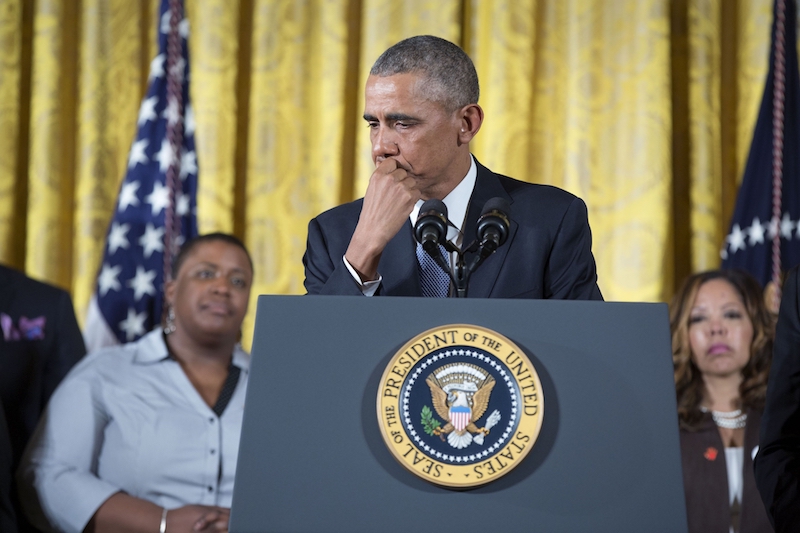This is the third of a three-part series analyzing gun violence in the United States. The first part examined the NRA’s outsize influence on US firearm regulations. Part II discussed the content of these laws. The final addition details the evidence behind gun control and ends with a comment on the Republican Party’s cynical response to American gun violence.
The United States is unable to meaningfully address gun violence not because there is a lack of solutions to the crisis, but because unrelenting ideology and irresponsible politicians get in its way. The truth is this: America’s staggering gun homicide rate is a direct result of lenient firearm laws which make it too easy for people — especially potentially dangerous people — to get their hands on guns and harm themselves or others. The logic then follows that if gun control was strengthened, gun-related violence would likely decline, and those wanting to cause grave harm would ultimately find it harder to do so.
There is a mountain of evidence to back this up. Last year, the scientific journal Epidemiologic Reviews had researchers look at 130 studies on gun control around the world. Their comprehensive research concluded that “the simultaneous implementation of laws targeting multiple firearms restrictions is associated with reductions in firearm deaths.” In simple terms: fewer guns mean fewer gun-related deaths, and not just homicide deaths. Keeping a gun in the house not only increases the risk of intentionally killing a family member or housemate but also the likelihood of suicide or accidental death.
The study from Epidemiologic Reviews demonstrates that the “debate” over whether gun control is effective is no longer actually a debate. It also reveals that other developed countries came to their senses long ago. Following two devastating massacres, the United Kingdom banned all semi-automatic firearms, enforced registration for shotgun owners, and eventually prohibited civilian ownership of handguns as well. While gun incidents did not initially go down due to the persistence of illegally-imported weapons, they did begin to drop when complementary police reforms were rolled out in the early 2000s. In the twenty years since the handgun ban was first introduced, the country has had only one mass shooting.
[perfectpullquote align=”right” cite=”” link=”” color=”” class=”” size=””]“In 2014, Japan had six gun-related deaths. That same year, the US had 33,599.”[/perfectpullquote]
The only other nation with stricter gun laws than Britain is Japan. The East Asian country not only imposes background checks and registration but also requires prospective gun owners write written exams, perform shooting tests, and undergo psychological assessments before they can possess a gun. If you make it through all of that, you have the choice of owning either a shotgun or an air rifle. In 2014, Japan had six gun-related deaths. That same year, the US had 33,599.
Australia is often the most cited example following an American mass shooting. While civilian-owned guns had at one point been quite prevalent here, a string of mass shootings culminating in a massive rampage in 1996 forced much of the country to give them up entirely. Despite substantial pushback from the country’s gun rights community, shortly after the massacre the Australian government “banned automatic and semiautomatic firearms, adopted new licensing requirements, established a national firearms registry, and instituted a 28-day waiting period for gun purchases.” They also implemented a government-purchase program in which they bought and destroyed over 700,000 civilian-owned guns that the recent reforms had banned. Six years later, Australia introduced further controls, this time on handguns used for sport shooting.
Since these changes, the country has not had another mass shooting. As a whole, firearm deaths also steeply declined in the first few years after the 1996 laws came into place. Though some experts suggest that Australia’s strict reforms do not entirely explain the reduction in firearm violence — this type of violence was already already on the decline — others have argued that the new laws are indeed responsible, especially in curbing suicide deaths. Indeed, the change in the country’s annual homicide rate has been striking. Between 1989-90 and 2013-2014, gun-related murders decreased by a whopping 57%. And from 1996 to 2013, the number of all homicides dropped by roughly 23% which suggests that stricter access to guns didn’t lead to an increase in violence by other means, something pro-gun advocates frequently suggest would occur if access to guns was tightened.
Gun control hasn’t only proven effective outside of America — there’s also significant proof to show that it has been successful in the US as well. The Giffords Law Center’s annual gun law scorecard reveals that states with stricter laws consistently have lower rates of gun violence compared to those with looser rules. “The 10 states with the weakest gun laws collectively have an aggregate level of gun violence that is 3.2 times higher than the average of the 10 states with the strongest gun laws,” according to a 2016 report by Chelsea Parsons and Eugenio Weigend of the Center for American Progress. In America Under Fire: An Analysis of Gun Violence in the United States and the Link to Weak Gun Laws, the pair goes on to detail which methods of gun control have proven particularly effective in the US. “When Connecticut implemented [a permit and background check] requirement, gun-related homicides in the state fell 40 percent,” said Parson and Weigend. “When Missouri eliminated this requirement, gun homicides increased 26 percent.”
Not only does gun control work, polling often shows that the US government’s inaction on gun violence is out of step with public opinion. In a 2016 survey by the New York Times, the vast majority of respondents supported laws that would prohibit gun sales to potentially dangerous individuals, such as those with mental illness, violent criminals, and suspected terrorists, as well as efforts to introduce mandatory licences and genuinely universal background checks. According to a more recent poll from NPR/Ipsos, 58% of those surveyed supported a complete ban on assault-style weapons, the guns most commonly used in mass shootings.
Even a majority of Republican voters appear to support stronger gun control. Unfortunately, this matters little if those who are vehemently opposed to stricter regulation are also the most active in the gun control debate. As long as this remains the case, GOP lawmakers will continue to ignore the evidence that stricter gun laws are effective, and that most Americans support them, and instead choose to appease a vocal albeit powerful minority of conservative voters.
What is perhaps most maddening in all of this is the way in which many of these same politicians respond to lesser, more rare threats of violence. In the wake of a mass shooting by a white American, conservative lawmakers mostly go quiet, coo their condolences and advise their colleagues not to politicize a tragedy. Meanwhile, any scent of terrorism committed by a Muslim or Arab person, and the Republican Party — and, most of all, its current president — goes into overdrive, harnessing these events for all their political worth. They engage in fear mongering pairing that with proposals for draconian measures vastly disproportional to the reality of the danger. In short, they exploit these security threats, balloon the public’s fear of them and instate overzealous policy along the way.
That is not to say that this type of terrorism doesn’t represent a real security threat. It does, and it shouldn’t be dismissed. But equally, politicians shouldn’t exaggerate the risk of ISIS-inspired attacks while, at the same time, blatantly neglecting the immensely more serious public security threat that is borne from inadequate gun regulation. If conservative lawmakers truly do care about keeping Americans safe from harm, they would ditch the NRA and enact stronger gun laws. However, if history is any guide, they won’t.
[perfectpullquote align=”right” cite=”” link=”” color=”” class=”” size=””]“The premise of the “good guy with a gun” endures because it touches on the core of American gun mythology.”
[/perfectpullquote]
In his comments following Sunday’s mass-shooting in West Texas, President Trump seemed to confirm this. When asked if he was open to stricter vetting of gun buyers, Trump suggested he was not because it could prevent good guys with guns from stopping bad guys with guns, and ultimately lead to even more devastating atrocities.
This infuriatingly simplistic “good guy with a gun” argument does not stand up to scrutiny for numerous reasons. Still, it continues to be a favourite among pro-gun advocates. And it’s not hard to understand why. Besides having long been drilled into conservatives by the NRA as well as legitimized by one of the country’s major political parties, the premise of the “good guy with a gun” endures because it touches on the core of American gun mythology. It embodies a yearning for a frontier-style America where people don’t need to rely on government, and the good guy always saves the day with his trusty Colt Peacemaker. The fact that this America doesn’t, and likely never did, exist doesn’t matter. Republicans won’t stop pandering to this fantasy as long as they think not doing so will cost them votes. Until this comes to pass, the blood of America’s gun violence victims will remain on their hands.
Photo of President Obama announcing “common sense” gun control reforms during his last year in office. Photo courtesy of Obama White House Archive.
Disclaimer: Any views or opinions expressed in articles are solely those of the authors and do not necessarily represent the views of the NATO Association of Canada.




